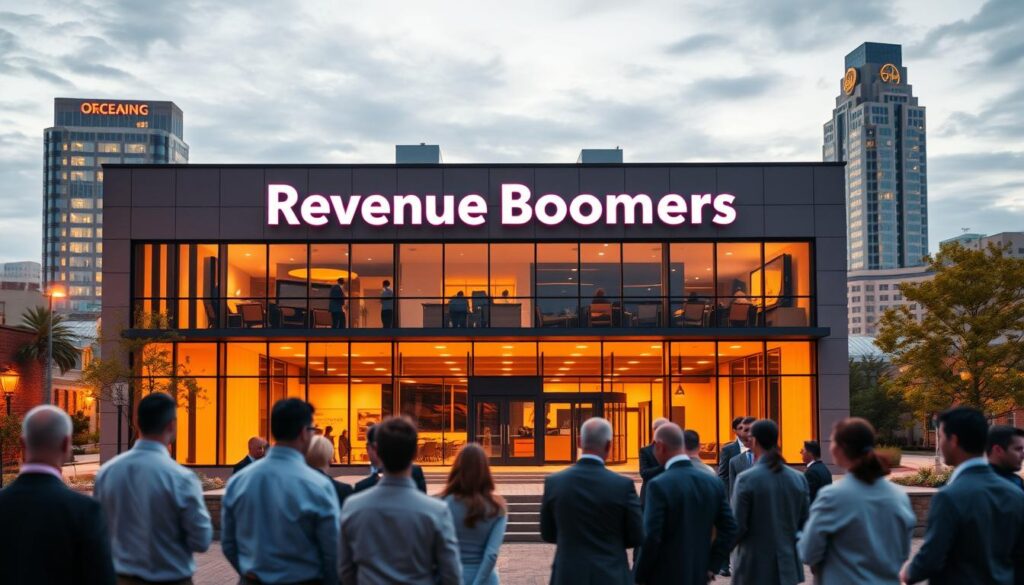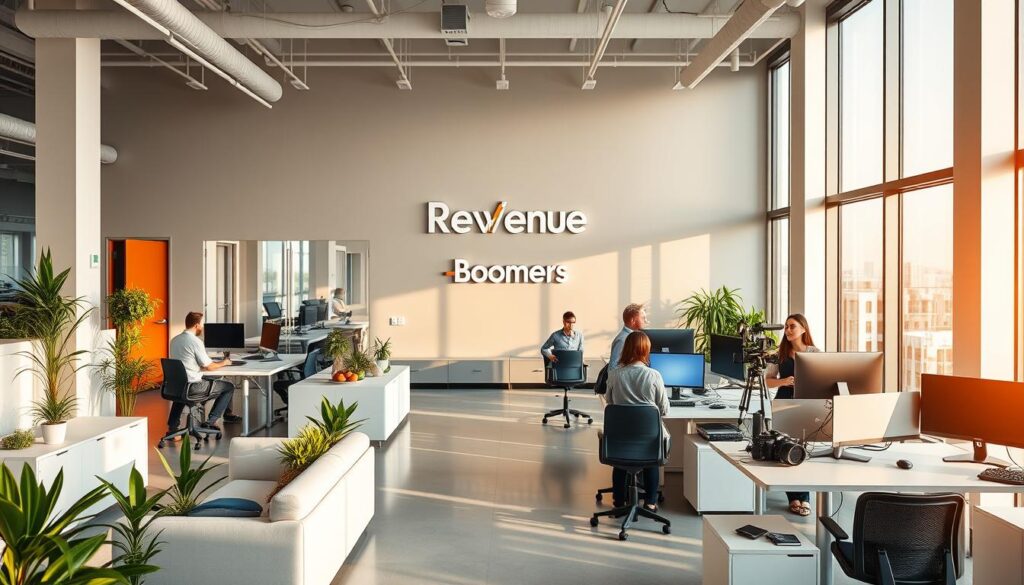Ever wondered what SEO really means for marketing agencies? It’s not just about getting your website to pop up first on Google. For agencies, SEO is like the secret sauce that helps them stand out in a crowded market. It’s about using smart strategies to boost visibility and attract more clients. In this article, we’ll break down the role of SEO in marketing agencies and how it can make a big difference in your business.
Key Takeaways
- SEO is essential for marketing agencies to improve online visibility and attract clients.
- A solid SEO strategy includes keyword research, on-page, and off-page optimization.
- Building links and using social media can boost your SEO efforts.
- Partnering with an SEO agency can provide specialized skills and save costs.
- Measuring SEO success involves tracking key performance indicators and adjusting strategies.
Understanding SEO’s Role In Marketing Agencies

Defining SEO for Marketing Agencies
Search Engine Optimization, or SEO, is all about making sure your client’s website is the first thing people see when they search online. For marketing agencies, it’s not just about getting more traffic; it’s about getting the right traffic. SEO involves tweaking a website’s content and structure so search engines like Google rank it higher. This means using the right keywords, improving site speed, and making sure the site works well on mobile devices.
The Importance of SEO in Digital Marketing
In the digital marketing world, SEO is a game-changer. It connects you with people who are already interested in what you’re offering. Without SEO, a marketing agency’s efforts can fall flat because no one will see the great content they create. SEO helps in building credibility and trust with your audience. When your site appears on the first page of search results, it tells users that you’re a leader in your field.
How SEO Enhances Client Services
SEO isn’t just about boosting your own agency’s profile; it’s about helping your clients succeed. By integrating SEO into your services, you can offer clients a comprehensive strategy that improves their online presence. This might include optimizing their website, conducting keyword research, or even creating content that attracts and retains their target audience. When clients see real results, like increased web traffic and higher search rankings, they’re more likely to stick around and recommend your agency to others.
SEO is the backbone of any successful digital marketing strategy. It’s not just about visibility; it’s about creating meaningful connections with your audience and delivering real value.
Key SEO Strategies for Marketing Agencies
Developing a Comprehensive SEO Strategy
Every marketing agency needs a solid plan to boost their clients’ online presence. Start by understanding the target audience and defining clear objectives. A strategy should include an analysis of current market trends and competitors. Agencies should focus on creating unique content that stands out. This approach can significantly improve visibility and rankings.
A well-thought-out SEO strategy is like a roadmap—without it, you’re just wandering.
Effective Keyword Research Techniques
Keyword research is the backbone of SEO. It involves identifying words and phrases potential clients use when searching online. Utilize tools to find high-volume keywords with low competition. This can help in crafting content that attracts more traffic. Remember, the right keywords can make or break your SEO efforts.
- Use keyword research tools to find relevant terms.
- Analyze competitor keywords to spot opportunities.
- Regularly update your keyword list to stay current.
On-Page and Off-Page Optimization
On-page optimization involves tweaking elements on your website to improve search engine rankings. This includes optimizing titles, meta descriptions, and headers. Off-page optimization, on the other hand, focuses on external factors like backlinks. Both are crucial for a balanced SEO approach.
- Ensure your website is mobile-friendly.
- Optimize images and media for faster loading times.
- Build quality backlinks to enhance credibility.
For a deeper dive into these strategies, consider this SEO strategy guide. Understanding these steps can greatly enhance your agency’s ability to deliver better results for clients.
Leveraging Existing Networks for SEO Success
Building Links Through Client Relationships
Building strong links isn’t just about quantity anymore. It’s about the quality and relevance of those links. Start with those who already know, like, and trust you—your existing clients. Reach out to them for cross-linking opportunities. Maybe they can feature your press releases on their site, or you can write a guest post for their blog. These quality backlinks can significantly boost your SEO, and sometimes all it takes is asking.
Utilizing Social Media for SEO
Social media isn’t just for engagement; it can be a powerful tool for SEO too. By sharing your content on platforms like Twitter or Facebook, you can increase visibility and drive more traffic to your site. Encourage your clients and partners to share your posts. This not only broadens your reach but also signals search engines that your content is worth sharing.
Networking with Industry Partners
Networking isn’t just about meeting people; it’s about creating opportunities. Collaborate with other businesses in your industry for joint ventures or co-hosted events. These partnerships can lead to new backlinks and increased exposure. Plus, when you collaborate, both parties benefit from the shared audience and increased credibility.
The Benefits of Partnering with an SEO Agency
Access to Specialized Expertise
When you team up with an SEO agency, you’re basically getting a whole team of experts who live and breathe SEO. These folks have been around the block, tackling projects of all sizes and scopes. They know the ins and outs of search engine algorithms, and they keep up with the ever-changing trends. This expertise can save you a ton of time and headaches. No need to get bogged down in the nitty-gritty of SEO; they’ve got it covered.
Cost-Effectiveness of Outsourcing SEO
Hiring an in-house team can be pricey—not just in salaries, but in training and tools too. With an SEO agency, you get access to all the tools and talent without the overhead. It’s like having a full-fledged SEO department without the hassle of managing one. Plus, you can scale your efforts up or down based on your needs, which keeps costs in check.
Scalability and Flexibility in Services
SEO needs can change fast. One day you might need a complete site overhaul, and the next, just a few tweaks here and there. An SEO agency offers the flexibility to adapt to these changes. They can ramp up efforts when you’re launching a new product or dial it back when things are steady. This adaptability ensures your SEO strategy is always aligned with your business goals.
By partnering with an SEO agency, businesses can focus on what they do best, leaving the SEO strategies to the experts. This collaboration not only enhances online visibility but also drives growth without the stress of managing SEO tasks in-house.
For businesses looking to boost their online visibility and drive traffic growth, choosing the right SEO agency is key. They bring expert knowledge, tailored strategies, and ongoing support to the table, ensuring your website adheres to the best practices and significantly improves search rankings and customer engagement.
Choosing the Right SEO Agency for Your Needs

Identifying Your SEO Goals
Before you even start looking for an SEO agency, it’s crucial to know what you want to achieve. Are you aiming to boost your website traffic, improve your search engine rankings, or increase your conversion rates? Maybe it’s all three. Clearly defined goals will guide your choice of agency, ensuring they offer the services you need. Here’s a simple list to help clarify your goals:
- Check and optimize your website’s current performance.
- Improve search rankings and increase traffic.
- Boost conversion rates.
Evaluating Agency Credentials
Once you’ve set your goals, the next step is to assess potential agencies’ credentials. Look beyond their website. Check out their awards, testimonials, and titles. A good reputation is a strong indicator of quality service. Don’t forget to read client reviews on platforms like Clutch or Trustpilot, and even Google Reviews. These insights can reveal much about their reliability and effectiveness.
Understanding Service Offerings
Not all agencies offer the same services, so it’s important to understand what each prospective agency provides. Do they specialize in on-page SEO, link building, or perhaps local SEO? Some might even offer niche services like mobile SEO or app store optimization (ASO). Knowing what you need and what they offer ensures a good match. Use this checklist when comparing agencies:
- On-page and off-page SEO
- Keyword research and strategy
- Local SEO and mobile SEO
Choosing the right SEO agency isn’t just about finding someone who can improve your rankings. It’s about building a partnership with a team that understands your business needs and can tailor their approach to meet them. Take your time, do your research, and don’t settle for less than what your business deserves.
Measuring SEO Success for Marketing Agencies
Key Performance Indicators for SEO
When it comes to SEO, knowing what to measure is half the battle. Key metrics for evaluating SEO success include organic conversions, organic traffic, keyword rankings, website authority, and click-through rate. These indicators help assess the effectiveness of SEO strategies and overall performance. But remember, just because your site ranks number one for a keyword doesn’t mean it’s a win if that traffic isn’t converting.
Tools for Tracking SEO Performance
Tracking SEO performance is like having a map on a road trip. You need the right tools to know where you’re going. Google Analytics and Google Search Console are staples in this field. They provide insights into organic traffic and keyword rankings. For more detailed reports, tools like Looker Studio and Agency Analytics can be game-changers, offering in-depth analysis and visualization of your SEO data.
Reporting and Analyzing Results
Once you’ve gathered your data, the next step is to make sense of it. Regular reporting is key. Many SEO companies provide monthly reports focusing on rankings, traffic, and conversions. These reports should be tailored to highlight the metrics that matter most to your agency’s goals. It’s not just about tracking numbers; it’s about understanding the story they tell about your SEO efforts.
Staying Updated with SEO Trends
Adapting to Algorithm Changes
SEO is a dynamic field, with search engines constantly updating their algorithms. For marketing agencies, keeping pace with these changes is essential. Algorithm updates can significantly impact search rankings, so it’s crucial to stay informed and adaptable. Here are some steps to help you adapt:
- Regularly Review SEO News: Follow reliable SEO news sources to stay informed about the latest algorithm updates.
- Analyze Traffic Patterns: Use analytics tools to monitor any sudden changes in website traffic, which may indicate an algorithm update.
- Adjust Strategies Accordingly: Be ready to tweak your SEO strategies based on new algorithmic requirements.
Emerging SEO Technologies
Incorporating new technologies can give marketing agencies an edge over competitors. Artificial intelligence and machine learning are increasingly playing roles in SEO, helping to analyze data and predict trends. Consider these advancements:
- Voice Search Optimization: With the rise of smart speakers, optimizing for voice search is becoming more important.
- AI-Driven Content: Use AI tools to generate content ideas and optimize existing content for better performance.
- Mobile-First Indexing: Ensure that your website is mobile-friendly, as search engines prioritize mobile-first indexing.
Continuous Learning and Development
The SEO landscape is ever-evolving, and continuous learning is key to staying ahead. Engaging in ongoing education helps marketing agencies refine their skills and strategies. Consider these approaches:
- Attend SEO Workshops and Webinars: Participate in industry events to learn from experts and peers.
- Engage in Online Courses: Enroll in courses that cover the latest SEO techniques and tools.
- Join SEO Communities: Network with other professionals to share insights and stay updated on industry trends.
Staying on top of SEO trends isn’t just about reacting to changes; it’s about anticipating them and positioning your agency to thrive in a constantly shifting digital landscape.
Conclusion
So, there you have it. SEO for marketing agencies isn’t just a buzzword; it’s a necessity in today’s digital landscape. With the right strategies, agencies can not only boost their own visibility but also help their clients shine online. It’s all about staying ahead of the curve and making sure you’re using every tool at your disposal. Remember, it’s not just about working harder, but working smarter. Keep learning, keep adapting, and most importantly, keep optimizing. That’s the key to success in the ever-evolving world of SEO.
Frequently Asked Questions
What is SEO and why is it important for marketing agencies?
SEO, or Search Engine Optimization, is a way to make websites show up higher in search results like Google. For marketing agencies, it’s important because it helps their clients get noticed online, which can lead to more business.
How can marketing agencies use SEO to help their clients?
Marketing agencies use SEO by improving their clients’ websites so they rank higher in search results. This includes finding the right keywords, making sure the website is easy to use, and getting other sites to link back to their clients’ sites.
What are some basic SEO strategies for marketing agencies?
Basic SEO strategies include doing keyword research to find what potential customers are searching for, optimizing web pages with those keywords, and building links from other websites to increase authority.
Why should a marketing agency consider partnering with an SEO agency?
Partnering with an SEO agency can give marketing agencies access to experts who specialize in SEO. This can save time and resources while providing better results for their clients.
How do marketing agencies measure the success of their SEO efforts?
Marketing agencies measure SEO success by looking at things like website traffic, search engine rankings, and how many people are visiting the site and taking action, like signing up for a newsletter or making a purchase.
What should marketing agencies look for when choosing an SEO partner?
When choosing an SEO partner, marketing agencies should look for someone with a good track record, clear communication, and services that match their clients’ needs. It’s also important to set clear goals and expectations.






